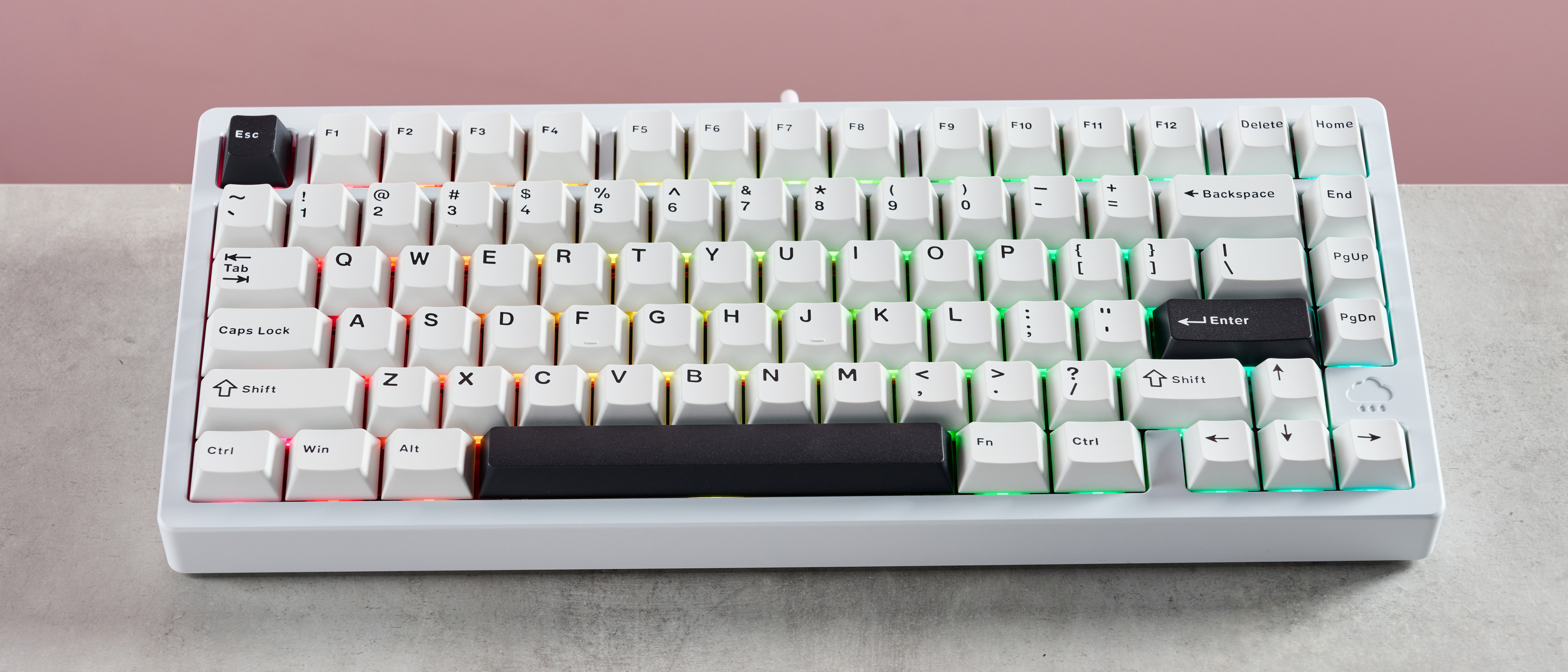TechRadar Verdict
The Wobkey Rainy 75 Pro is an easy keyboard to use, whether you’re typing or gaming. It’s also built like a tank – and weighs about as much as one, which may be a benefit or a liability depending on your preferences. However, this is yet another keyboard that needs wrist support for optimum comfort, and the poor user experience of its VIA software is another drawback. For this price, you would expect these flaws to be addressed, so ultimately there are better value alternatives in this already saturated marketplace.
Pros
- +
Great for typing and gaming
- +
Extremely sturdy build
- +
Easy connectivity switching
Cons
- -
Uncomfortable angle without wrist support
- -
Software isn’t the most user friendly
- -
At the expensive end of the market
Why you can trust TechRadar
Wobkey Rainy 75 Pro: one-minute review
The Wobkey Rainy 75 Pro is a wireless mechanical keyboard with numerous connectivity options for great flexibility. It has a rather restrained aesthetic, although the vibrant RGB lighting and various colorways help make it stand out. It lacks the pomp of many gaming keyboards, and it’s all the better for it in my view.
In terms of build quality, the Rainy 75 Pro is dense and very heavy, while the aluminum casing makes it near impossible to dent or damage. The double-shot PBT keycaps also feel premium, with their smooth texture and subtle indentations.
The board is also quite thick, especially at the back, and there are no adjustable feet. Thankfully, the stock angle allows for a good typing position, although I still would’ve welcomed some form of wrist support, since I did find the Rainy 75 Pro uncomfortable after long periods.
Customizations are available courtesy of the VIA web app. Here you’ll find a macro creator and RGB lighting adjustments, with plenty of effects to choose from. There are also myriad shortcuts available for remapping, rivaling many of the best keyboard options around, although the interface doesn’t do a great job of presenting them in the cleanest manner.
There are other issues with this web app: it requires you to download JSON files to work, while profiles have to be saved as files on your PC, both of which feel outdated and clunky. What’s more, there aren’t any performance-related tweaks, and sometimes it would lose connection to the keyboard altogether.
Thankfully, in action, the Rainy 75 Pro provides a mostly enjoyable experience. The linear Cocoa switches in my unit were snappy and responsive, with a light actuation and a very satisfying feel, which made for fast typing. However, beware that they are quite loud.
Connectivity is mostly great, and switching between Bluetooth and 2.4.GHz devices is easy. However, I did experience momentary lagging in one particular instance when connected via the latter method to my PC, which is obviously disappointing, but thankfully only occurred once.
Sign up for breaking news, reviews, opinion, top tech deals, and more.
Despite how solid and pleasurable it is to use, the Rainy 75 Pro is still an expensive keyboard and it faces some stiff competition, such as the Razer Pro Type Ultra and the MonsGeek FUN60 Ultra, the latter of which is cheaper but performs equally well. If you’re looking for the sturdiest board around with effortless typing, the Rainy 75 Pro is hard to beat on these fronts. But all things considered, it's hard to justify its expense in a market full of great value alternatives.
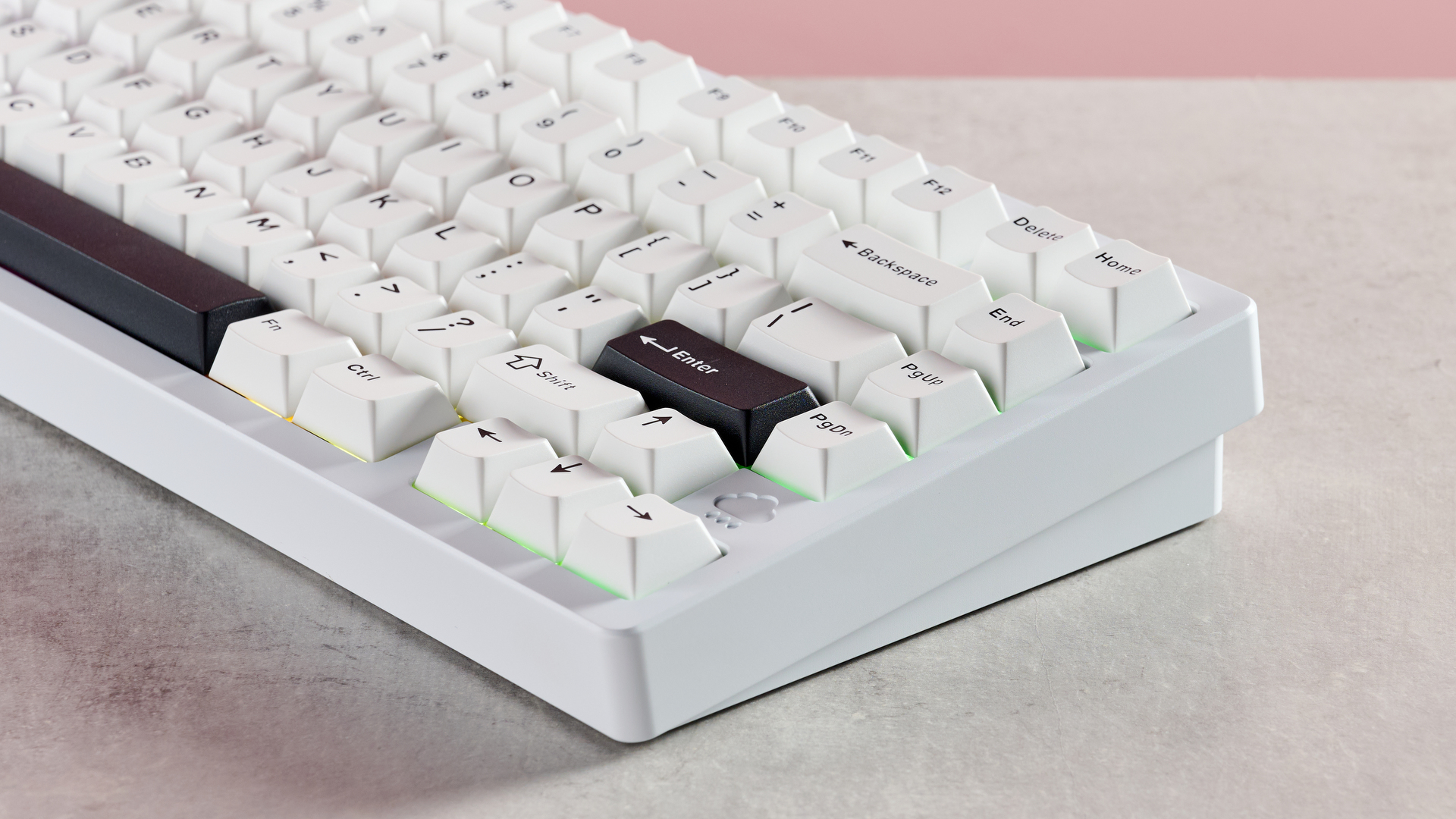
Wobkey Rainy 75 Pro review: price and availability
- $139 / £159 / AU$239
- Available now in multiple variants
- High-end of the market
The Rainy 75 Pro costs $139 / £159 / AU$239 and is available in multiple colorways and switch types. Wired and non-RGB versions are also available with lower prices. It comes with a keycap puller, USB cable, 2.4GHz USB dongle, and three spare switches.
This places it at the premium end of the space, although when you consider its high build quality, mechanical switches and multiple connectivity modes, it makes a little more sense. It’s close to the same price as the Razer Pro Type Ultra, although that board is full-size, making it a better choice for productivity purposes.
However, the Rainy 75 Pro is more expensive than the MonsGeek FUN60 Ultra. That board has analog switches, which allow for various actuation adjustments to be made, an aspect shared by some of the best gaming keyboard options. It also features multiple wireless modes, although it has a 60% layout, which means it lacks quite a few useful keys present on the Rainy 75 Pro.
Value: 3 / 5
Wobkey Rainy 75 Pro review: specs
Layout | 75% |
Switch | Mechanical |
Programmable keys | Yes |
Dimensions | 12.6 x 5.4 x 1.8 inches (32 x 13.7 x 4.6cm) |
RGB or backlighting | Yes (customizable) |
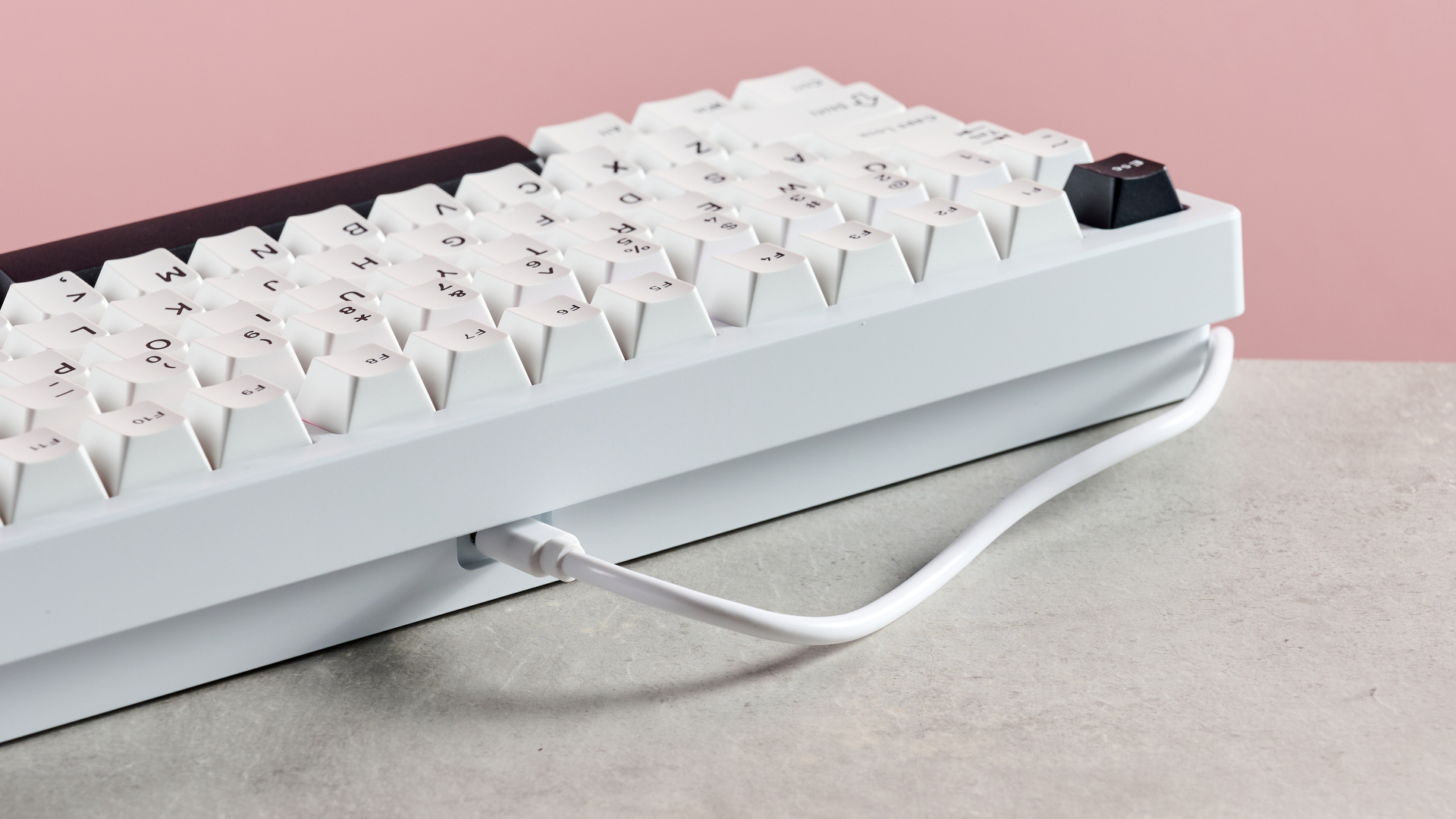
Wobkey Rainy 75 Pro review: design and features
- Exceptionally heavy
- Well made
- Not the most convenient software
The Wobkey Rainy 75 Pro has a somewhat muted appearance, especially in the white colorway I had on my review unit. It looks modern enough, and the lack of gamer touches is something I welcome, while the RGB lighting does enough to add vibrancy.
It’s also one of the heaviest keyboards I’ve ever used. It feels extremely dense and sturdy as a result, and if you’re prone to gamer rage, be careful of venting your frustrations out on this one. The aluminum casing feels very premium and hard wearing too.
The Rainy 75 Pro is also quite thick, although mercifully it has a fairly steep tilt angle, so the front end is lower to the ground than the back. This makes getting a comfortable position easier, although I found that my wrists still had to bend noticeably to reach the keys.
The double-shot PBT keycaps have a smooth texture and feel high quality, as you would expect. They also have minimal indentation, but it’s enough to secure your finger tips in place.
There are some useful default shortcuts on the Rainy 75 Pro, including the ability to hot-switch between Bluetooth and 2.4GHz devices using the Fn and Tab keys. However, it’s a shame that none of the keys have their Fn shortcuts labelled on them.
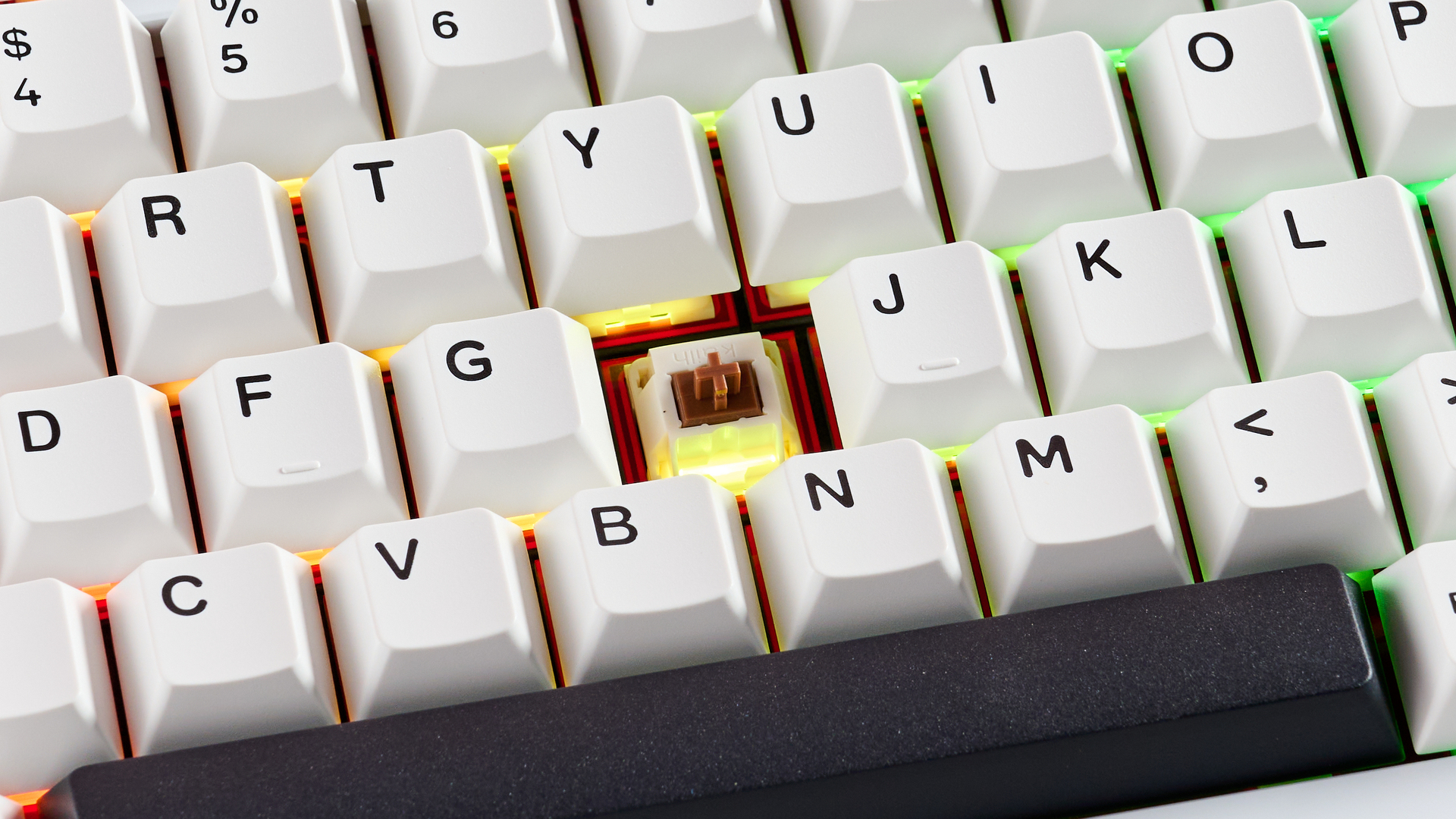
However, what’s more inconvenient is the switch for activating the wireless capability, since it’s located underneath the Caps Lock key, meaning you have to remove it to access it – a baffling design choice and one I’ve seen before on the MonsGeek FUN60 Ultra.
Thankfully, it’s rarely needed as it can be left in the on position, even when using the board with a wired connection. The only time I needed to switch it to the off position was when installing a firmware update.
The Rainy 75 Pro makes use of the VIA web app for its customization abilities. This provides the usual tinkering options, with macro creation, RGB settings, and plenty of remapping options.
However, the web app isn’t the most user-friendly interface, requiring you to download and then upload JSON files manually to get working. You also have to save your custom settings as files to your computer, which is also inconvenient and outdated.
I encountered other usability issues, too. There were occasions where the key remapping function wouldn't work, and sometimes the board lost connection to the web app, requiring me to refresh the page to remedy.
The layout of this web app also leaves a lot to be desired, as the scattergun approach to listing all the remaps isn’t the best presented, making it hard at times to find the shortcuts you need.
Design & features: 3.5 / 5
Wobkey Rainy 75 Pro review: performance
- Light and snappy
- Great for typing
- Can get uncomfortable
The performance of the Rainy 75 Pro is excellent, whether you’re gaming or typing. The linear Cocoa switches in my unit had a very light and snappy actuation, with plenty of rebound and a relatively short travel, all of which made for quick taps and fast typing. Their lubed yet clicky feel also provided plenty of feedback, resulting in a tactile feel to match the best mechanical keyboards.
However, typing is quite loud, and while the Rainy 75 Pro is comfortable to use for the most part, that aforementioned thickness and the wrist bend required to access the keys did cause me some discomfort after a while. This is yet another keyboard where I would’ve appreciated a wrist pad.
Connectivity is seamless in the main, and I found switching between Bluetooth and 2.4GHz quick and easy. Battery life also seems reasonable, if not exceptional, dropping to 80% after several days of varied use between Bluetooth and 2.4GHz.
However, I did experience some serious lag on one occasion when playing a game, causing a severe delay to my inputs. My mouse inputs were unaffected, so I don’t believe it was an issue with the game.
This is obviously concerning, but I should stress this only happened once during my several days with the Rainy 75 Pro, and what’s more, it was fleeting. Still, it’s worth mentioning all the same.
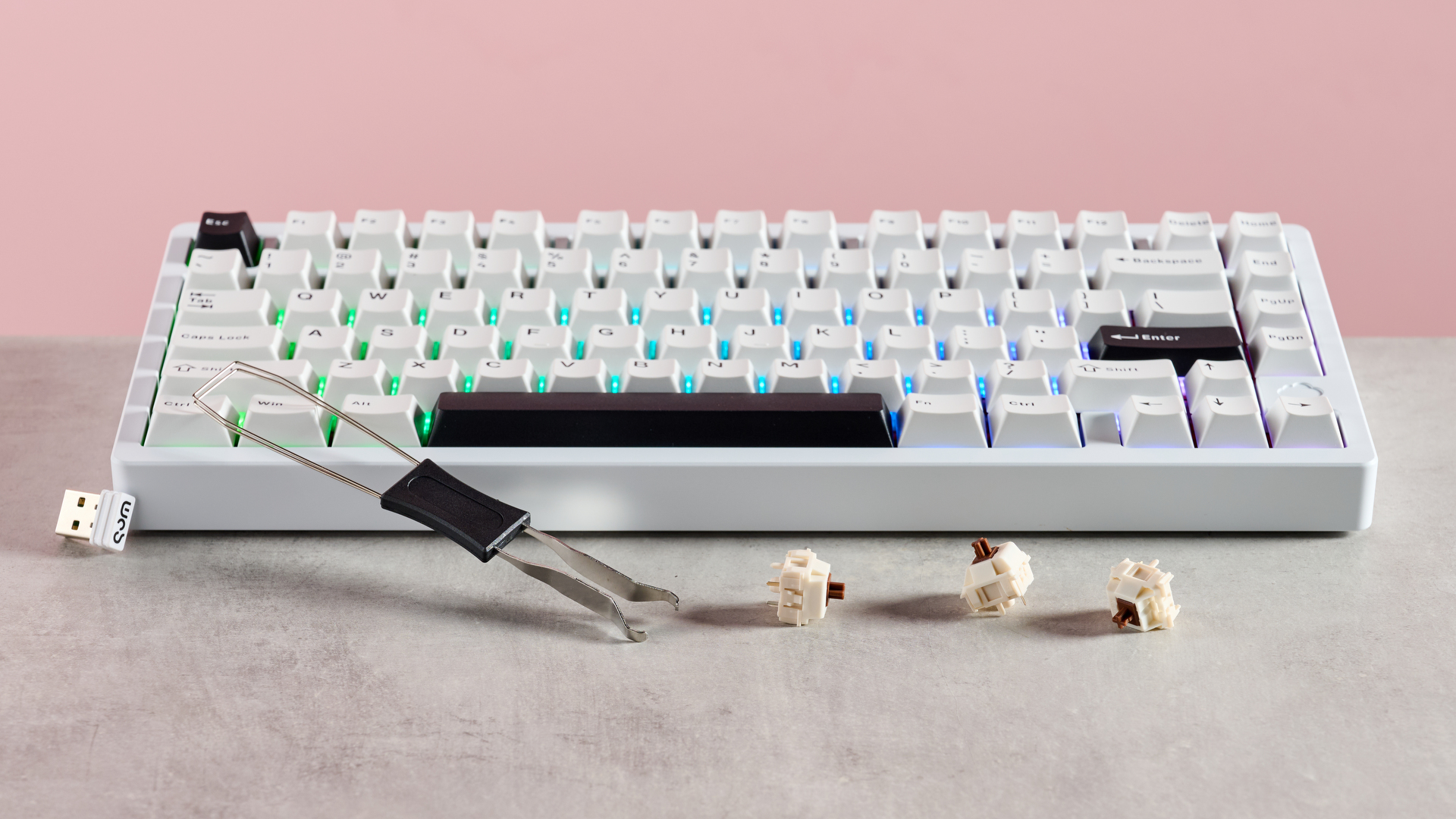
Performance: 4 / 5
Should I buy the Wobkey Rainy 75 Pro?
Attributes | Notes | Rating |
|---|---|---|
Value | The Rainy 75 Pro is quite expensive, and although it offers a lot, there are plenty of competitors at this price point – and below. | 3 / 5 |
Design and features | The Rainy 75 Pro is exceptionally solid and heavy, and it uses double-shot PBT keycaps. The customization web app isn’t the best, though, and it’s a little too thick for long-term comfort. | 3.5 / 5 |
Performance | Light and snappy, the Rainy 75 Pro is great for typing and gaming, with a satisfying feel. I did experience a brief connection issue on one occasion, though. | 4 / 5 |
Overall | The Rainy 75 Pro is very enjoyable to use, and the build quality is very impressive. However, the lack of wrist support, awkward software, and high price hold it back somewhat. | 3.5 / 5 |
Buy it if…
You want easy typing
The snappy actuation and fast rebound make this a very tactile and easy board to type fast on.
You a sturdy unit
The sheer weight of the Rainy 75 Pro alone is testament enough to its build quality, but the aluminum material further consolidates this.
Don’t buy it if…
You want the best software
The VIA web app isn’t the easiest or most convenient to use, and there are no performance-based tweaks available for hardcore gamers.
You want to save money
The Rainy 75 Pro isn’t exactly cheap, and there are plenty of keen competitors around at this price.
Wobkey Rainy 75 Pro review: also consider
| Header Cell - Column 0 | Wobkey Rainy 75 Pro | MonsGeek FUN60 Ultra | Razer Pro Type Ultra |
|---|---|---|---|
Layout | 75% | 60% | Full size |
Switch | Mechanical | Analog (TMR magnetic) | Mechanical |
Programmable keys | Yes | Yes | Yes |
Dimensions | 12.6 x 5.4 x 1.8 inches (320 x 137 x 46mm) | Not stated | 17.28 x 5.16 x 1.57 inches (439 x 131 x 40mm) |
RGB or backlighting | Yes (customizable) | Yes (customizable) | Yes (customizable) |
Razer Pro Type Ultra
If you’re looking for a similarly premium experience, the Razer Pro Type Ultra is a great alternative, especially if you plan on doing a lot of typing. It’s about the same price as the Rainy 75 Pro, but has a full-size layout. However, like the Rainy 75 Pro, we found its angle a little steep for optimum comfort levels, but in all other regards, it’s an excellent keyboard for work and play. Read our full Razer Pro Type Ultra review.
MonsGeek FUN60 Ultra
Another formidable slab of a keyboard, the FUN60 Ultra has a 60% layout, so it lacks some keys useful for productivity and certain games. However, it’s great for typing with, and its TMR analog switches make it a boon for gamers. What’s more, it’s remarkably cheap considering its premium feel and performance, so it’s certainly a board worth considering if you can live with the compromised layout. Read our full MonsGeek FUN60 Ultra review.
How I tested the Wobkey Rainy 75 Pro
- Tested for several days
- Used for gaming and typing
- Plentiful keyboard experience
I tested the Rainy 75 Pro for several days, during which time I used it for gaming and typing. I used all of its connectivity modes on both Windows 10 and Windows 11 systems. I played Counter-Strike 2, a good test for keyboards since it requires fast and accurate inputs.
I have been PC gaming for over a decade and have plenty of experience with keyboards of all kinds. I have also reviewed a large number of them, with different connectivity methods, switch types, layouts, and price points.
- First reviewed: May 2025
- Read more about how we test

Lewis Maddison is a Reviews Writer for TechRadar. He previously worked as a Staff Writer for our business section, TechRadar Pro, where he gained experience with productivity-enhancing hardware, ranging from keyboards to standing desks. His area of expertise lies in computer peripherals and audio hardware, having spent over a decade exploring the murky depths of both PC building and music production. He also revels in picking up on the finest details and niggles that ultimately make a big difference to the user experience.
You must confirm your public display name before commenting
Please logout and then login again, you will then be prompted to enter your display name.
